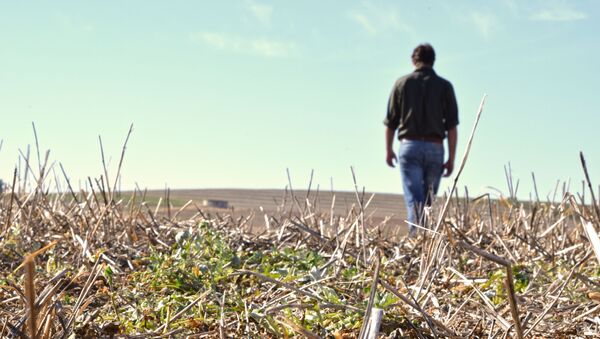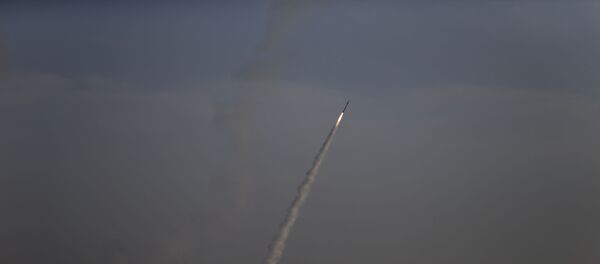Israel was paralysed on Tuesday with the government opting to block roads, close offices, schools and kindergartens, after a "surgical" strike that led to the killing of one of the Palestinian Islamic Jihad leaders in Gaza, Baha Abu Al-Atta.
In response, the group launched over 200 rockets from Gaza to Israeli towns and cities, with the Iron Dome Aerial defence system intercepting 90 per cent of them.
'They Won't Stop Us'
While the recent barrage of rockets prompted many Israelis, residing in the vicinity of the Gaza border, in communities that are used to constant the rocket rain, to leave their houses out of fear for their lives, some say the security situation is not a reason to panic.
Despite Home Front Command's warnings to avoid any unnecessary activities in fields, Avichai Brodutch, a local farmer, who has been growing pineapple in Kfar Gaza, (a Gaza-border community located less than two kilometers away from the fence that separates Israel from the Strip), decided to stay, as he remains optimistic, saying the security situation does not present a major headache to him.
"I stayed on the kibbutz. I needed to water the pineapple, but the escalation of tensions kept me indoors", he said over the phone, adding that he believed the plants would survive the unexpected turn of events.
Brodutch moved to Kfar Gaza five years ago, amid Israel's Operation Protective Edge in 2014. Back then, Gaza-based militants fired more than 4,500 rockets on Israeli cities, with many hitting communities near the Gaza border. In a bid to halt the shelling, Israel responded with fire, and according to estimates by the Palestinian Authority, caused damage worth $7.8 billion, leaving more than 100 thousand Palestinians homeless.
But Brodutch said the events didn't deter him from moving to Kfar Gaza.
"I wanted to live in the community of the kibbutz, and I knew that the tensions would cease one day, so I was not afraid", he said.
Despite the optimism, he does admit that being a farmer is tough, regardless of where you live, but tensions with Gaza can complicate things even further.
"When I decided to move here, everyone was trying to talk me out of doing so. They warned me that I had little chances to succeed in lifting this initiative (growing pineapples). The climate in the south was not ideal for the product, theft was blooming, and the security situation didn't contribute to stability either. But in agriculture, you have to be optimistic to succeed, and I did", he said.
Although Brodutch admits his business never suffered a serious blow due to the security situation, apart from minor hiccups - he knows he is one of the very few lucky ones.
The Hardships
In 2018 several Israeli farmers flew to the Hague to file an official lawsuit against Hamas militants and their activists for setting their fields on fire.
If until 2018 Islamic militants mostly concentrated on launching rockets many of which exploded in open fields causing damage to crops, the situation changed in March 2018 after the eruption of the March of Return protests that demanded that Israel remove the blockade of the enclave and solve the issue of Palestinian refugees.
It was then that Gaza-based militants developed new tactics, and in addition to rockets started launching helium-inflated balloons and condoms to Israeli border towns.
In 2019, Israel's Ministry of Foreign Affairs estimated that since 2018 Hamas militants have launched more than 2100 incendiary devices. The ministry calculated that the damage caused by mortars and rockets stood at around $10 million, whereas the damage caused by the incendiary balloons stood at around $4 million.
Brodutch recalls that one such balloon landed a meter away from him when he was working in the field. But he was not bothered. "All my pineapple plants are protected with a special net. When such ballons land, the incendiary material leaves holes and marks on the net, but the product itself is undamaged", he said, adding that he is aware of the hardships other farmers have.
"I know people whose fields have been completely burned. It deters many. Some prefer not to come here at all because of the situation, especially when there are the weekly protests at the fence. But hardships are an integral part of being a farmer. You overcome the difficulties, move on and you plant everything from scratch", he said.
Despite these troubles, Brodutch says he has hope for a better future. "I don't want to tell the government what to do, but if I were a politician, I would do my best to reach an agreement and secure peace. And I have hope that one day I will be able to go to Gaza and have hummus there with some locals," he concluded jokingly.
The views expressed in this article are solely those of the speaker and do not necessarily reflect the official position of Sputnik.



